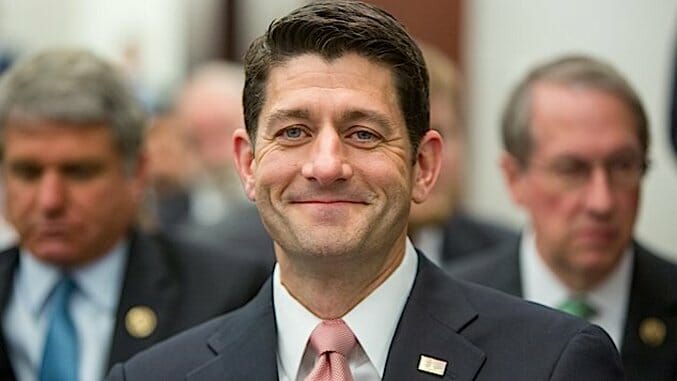Paul Ryan May Be Less Outlandish Than Donald Trump, But He’s a Bigger Threat
Photo courtesy of Getty
Unlike President-elect Trump, House Speaker Paul Ryan can pass for a carbon-based life form. His boyish physical appearance and wonkish image are not exactly the stuff of nightmares (those creepy eyes, on the other hand…). More substantively, Paul Ryan does not make an overt appeal to bigotry (although he is capable of unbearable paternalism), mock disabled reporters, talk about the size of his penis on national TV, or brag about sexually assaulting women. Ryan also seems to possess a superficial respect for democratic norms and Constitutional rights. This is not much (especially considering he’s a big fan of Citizens United), but given Trump and the alt-right’s alarming disregard for the First Amendment, it’s something. Oh, and he would rather see undocumented immigrants be exploited by corporations than kick them out of the country.
But don’t let the fact that Paul Ryan isn’t Trump fool you. The House Speaker is a threat in his own right who, unlike Trump, is completely unconstrained by any populist pledges made in the heat of a presidential campaign. Instead, he is free to inflict his austerity on federal, state and local levels. In light of Paul Ryan’s ambition to remake government in his austere ideological image, the media’s fawning over him is almost as egregious as its normalization of Trump. Unless Paul Ryan inserts himself into, say, an increasingly high-profile story about the Obama Administration’s decision to halt construction on the Dakota Access Pipeline (hint: the House Speaker opposes the decision as “big government decision-making at its worst”), his reactionary vision does not receive the scrutiny it deserves. For those who care to look, however, Paul Ryan’s policies speak for themselves.
Said policies, most of which President Trump is likely to rubber stamp (perhaps that’s why Ryan gives Trump a pass on his most egregious statements and Tweets), would eviscerate the social safety net, placing on the chopping block not only the legislative accomplishments of the Obama years, but basic and beloved elements of the social contract in place since the New Deal and the Great Society. Ryan would cut the Supplemental Nutritional Assistance Program (SNAP), better known as food stamps, along with other programs that benefit the poor.
Paul Ryan has also long sought to privatize (and cut) Medicare and Medicaid, including the Children’s Health Insurance Program (CHIP). Given Trump’s appointment of privatization proponent Tom Price as Director of Health and Human Services, Ryan will likely get the chance. Even Social Security, a promise for generations of Americans, is not safe. Paul Ryan has the audacity to call his plan for regressive taxation and draconian spending cuts “A Better Way.” A better way for the wealthiest Americans, perhaps, but for everyone else? Not so much. But the mainstream media prefers to focus on Trump’s outlandish Tweets, many of which are destined to be forgotten after a couple of news cycles.
Every aspect of American life that relies on federal funding will be adversely affected, diminishing overall quality of life for all but the wealthiest of citizens. And what will the American people receive in return? Little to nothing, at least for those who aren’t millionaires and billionaires. In keeping with his extreme aversion to spending any money for the public good, Ryan opposes even Trump’s inadequate, crony capitalist infrastructure bill at a time when America’s roads and bridges are literally crumbling.
-

-

-

-

-

-

-

-

-

-

-

-

-

-

-

-

-

-

-

-

-

-

-

-

-

-

-

-

-

-

-

-

-

-

-

-

-

-

-

-








































